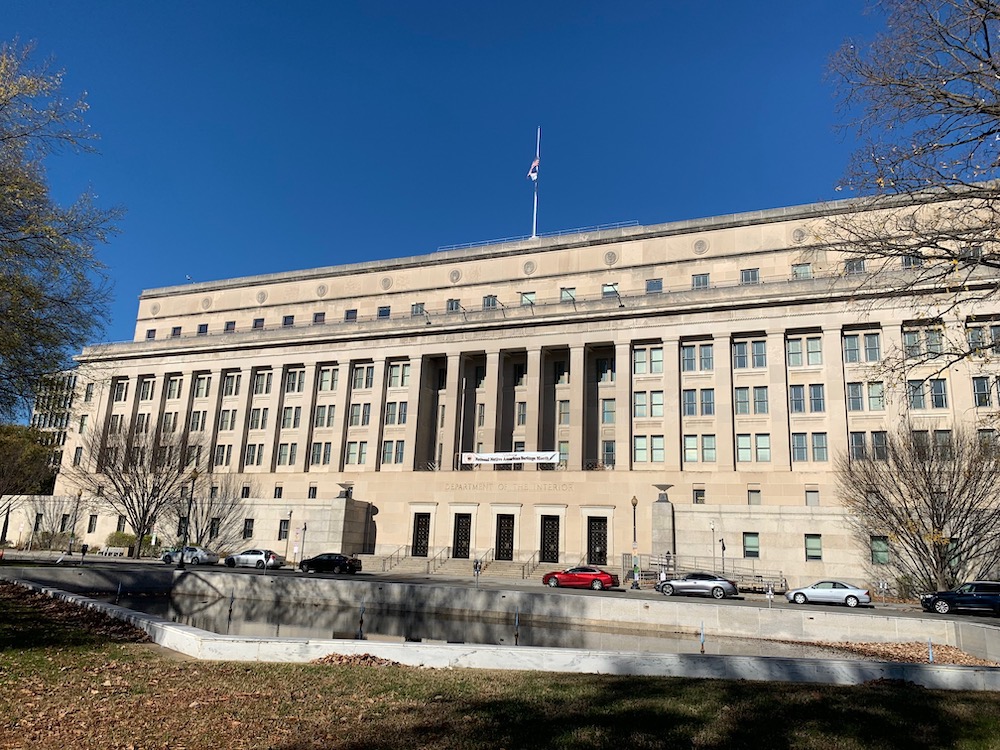
- Details
- By Brian Edwards
WASHINGTON – The Department of the Interior is seeking input from Tribes and Native artists about updating the federal truth-in-advertising law that makes it illegal to sell artwork in a manner that falsely suggests it is “Indian-made.”
In a letter to tribal leaders today, the DOI said it would hold a series of nation-to-nation consultation sessions with Tribes and listening sessions with Native artists over the next five months to get input on modernizing regulations used to implement the Indian Arts and Crafts Act (IACA).
The first session is scheduled for Wednesday as part of the Reservation Economic Summit (RES) in Las Vegas this week. Other listening sessions will also be held at major events where Native artists gather, such as pow-wows and festivals, in order to maximize opportunities for input to be provided by those who are most affected. The sessions will be closed to the media.
“Arts and crafts are important to Native communities, both culturally and economically,” Assistant Secretary for Indian Affairs Bryan Newland said in a statement. “Updating these regulations to include modern forms of art and craft work will support Indigenous artisans and craftspeople. The changes we are exploring are intended to further protect the authenticity of Indian-made products and help ensure that Native people can receive fair compensation for their work.”
The draft revisions bring a equal focus to promotional activities, expand the definition of Indian Product, allow for non-Indian labor to work on Indian Products in certain situations, and use a new certification trademark to certify that an item is an Indian Product, according to the letter tribal leaders.
Individuals and tribes can also submit written comments by emailing [email protected] no later than 11:59 pm ET on Friday, September 1, 2023. After the comment period closes, the DOI will evaluate the feedback before determining potential next steps, according to a spokeperson.
The DOI’s work to update the IACA regulations comes as the Senate Committee on Indian Affairs seeks input on its own legislative effort to strengthen enforcement of laws against fake Native art.
Last month, Sen. Brian Schatz (D-HI) announced the Indian Affairs committee is seeking public comment on a discussion draft of the proposed Amendments to Respect Traditional Indigenous Skill and Talent (ARTIST) Act of 2023. The ARTIST Act would update the IACA to strengthen protections against counterfeit competition for Native artists and their works. The deadline for comments on the ARTIST Act discussion draft is April 14.
Separately, the DOI also announced Jordan Ann Craig and Jamie Okuma as new commissioners to the Indian Arts and Crafts Board today. The board, appointed by the Secretary of the Interior, is responsible for implementing the IACA regulations and promoting economic development in Indian Country through the expansion of the Indian arts and crafts market.
More Stories Like This
Native News Weekly (August 25, 2024): D.C. BriefsUS Presidents in Their Own Words Concerning American Indians
Indigenous Actor Elaine Miles Reports Detention by Alleged ICE Agents
Happy Thanksgiving from Native News Online
Coming Up on Native Bidaské: Behind the Animation: Joey Clift Talks “Pow” and Native Storytelling
Help us tell the stories that could save Native languages and food traditions
At a critical moment for Indian Country, Native News Online is embarking on our most ambitious reporting project yet: "Cultivating Culture," a three-year investigation into two forces shaping Native community survival—food sovereignty and language revitalization.
The devastating impact of COVID-19 accelerated the loss of Native elders and with them, irreplaceable cultural knowledge. Yet across tribal communities, innovative leaders are fighting back, reclaiming traditional food systems and breathing new life into Native languages. These aren't just cultural preservation efforts—they're powerful pathways to community health, healing, and resilience.
Our dedicated reporting team will spend three years documenting these stories through on-the-ground reporting in 18 tribal communities, producing over 200 in-depth stories, 18 podcast episodes, and multimedia content that amplifies Indigenous voices. We'll show policymakers, funders, and allies how cultural restoration directly impacts physical and mental wellness while celebrating successful models of sovereignty and self-determination.
This isn't corporate media parachuting into Indian Country for a quick story. This is sustained, relationship-based journalism by Native reporters who understand these communities. It's "Warrior Journalism"—fearless reporting that serves the 5.5 million readers who depend on us for news that mainstream media often ignores.
We need your help right now. While we've secured partial funding, we're still $450,000 short of our three-year budget. Our immediate goal is $25,000 this month to keep this critical work moving forward—funding reporter salaries, travel to remote communities, photography, and the deep reporting these stories deserve.
Every dollar directly supports Indigenous journalists telling Indigenous stories. Whether it's $5 or $50, your contribution ensures these vital narratives of resilience, innovation, and hope don't disappear into silence.
 The stakes couldn't be higher. Native languages are being lost at an alarming rate. Food insecurity plagues many tribal communities. But solutions are emerging, and these stories need to be told.
The stakes couldn't be higher. Native languages are being lost at an alarming rate. Food insecurity plagues many tribal communities. But solutions are emerging, and these stories need to be told.
Support independent Native journalism. Fund the stories that matter.
Levi Rickert (Potawatomi), Editor & Publisher

